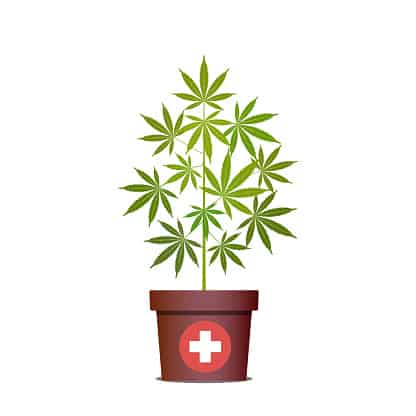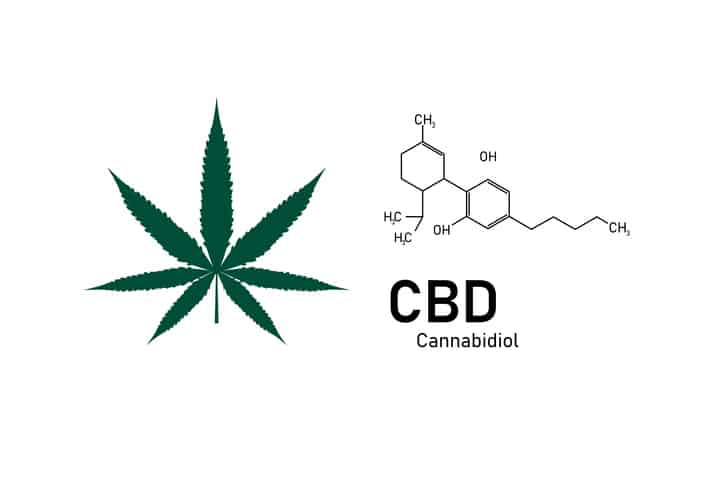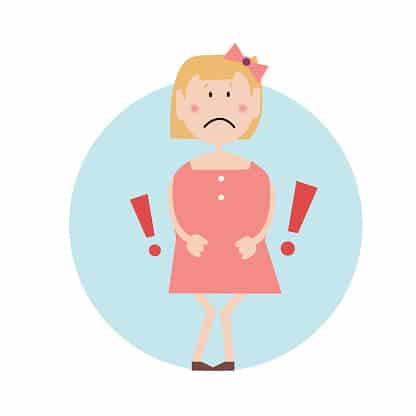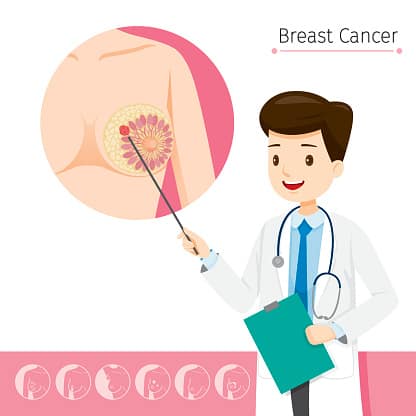CBD oil is a natural remedy derived from the cannabis plant.
As the source of both marijuana and hemp, any substance made from cannabis immediately raises concerns around its legality and safety.
However, certain components of the cannabis plant can be beneficial for health and healing, without getting you “high”.
CBD oil contains one of those powerful components. It’s become a hot topic among natural health circles who claim it can help with everything from chronic pain relief to cancer.
Here we breakdown what CBD oil is, its best uses, and what the early science can tell us about its reported benefits.
What is CBD Oil?

Also known as cannibidiol, CBD is 1 of over 100 cannabinoid compounds found in the cannabis plant.
Cannabinoid compounds are substances that bind to receptors throughout the body and brain.
Once extracted from the plant, CBD is then diluted with a carrier oil, like coconut or olive oil. It can also be extracted from hemp, a form of cannabis used for industrial purposes.

Unlike marijuana, CBD oil does not contain THC, the mind-altering compound that gives you the feeling of being high. That means CBD oil does not get you “high” or alter your state of mind.
The use of cannabis for medicinal purposes is not a new concept either. In fact, cannabis has a long medical history dating as far back as 2900 B.C. in China (1).
How is CBD Oil Different from Hemp Seed Oil and Cannabis Oil?
It’s easy to confuse CBD from other cannabis-based oils, but there are significant differences.
- Hemp Seed Oil: The seeds of industrial hemp are cold-pressed to create a nutty-like oil. Only small traces of cannabinoids, including CBD, are present. Hemp seed oil is high in monounsaturated fats and vitamin E. It’s used for cooking, skin-care products and bio-fuels.
- Cannabis Oil: Cannabis oil is typically made from marijuana with a high THC percentage. Therefore, it must be purchased in an area where marijuana is legal or can be obtained with a prescription. The amounts of compounds, including CBD and THC, will drastically vary from product to product. Commercially produced cannabis oils will have more controlled concentrations of CBD and THC for medical purposes.
Full Spectrum CBD vs. CBD Isolate
One more distinction you may see on CBD oil products is whether it’s full spectrum or isolate.
Full spectrum or whole plant CBD contains all other 100+ cannabinoids found in the cannabis plant, including trace amounts (up to 0.3%) of THC, whereas CBD isolate contains 100% CBD.
While research is still limited, one study did find that the full spectrum form was a more effective anti-inflammatory than pure CBD, at least in mice (2).
Summary: Cannibidiol or CBD is a major compound found in the cannabis plant. It’s extracted from marijuana or hemp, then diluted in oil to create CBD oil. Unlike marijuana or cannabis oil, it does not contain THC, the psychoactive part of the plant that gives you the feeling of being high.
The Potential Health Benefits of CBD Oil

Advocates claim CBD oil can help with a variety of conditions, including chronic pain, anxiety, depression, acne and even cancer.
Because of cannabis’ long-time status as an illegal Schedule 1 drug, research on CBD oil is still in its infancy. Here’s what we know now.
1. CBD Oil May Relieve Chronic Pain

Early research has shown promising results for the use of CBD oil in relieving chronic pain.
Many studies have found that CBD can reduce joint inflammation and other inflammatory pain in rats, without side effects. This may point to potential relief from arthritis in humans (3).
In fact, one of the first trials of Sativex, a medicine that contains both CBD and THC, reported significant improvement in pain and sleep quality in 58 rheumatoid arthritis patients (4).
The same medicine showed a notable reduction in pain and muscle spasms in a small group of people with Multiple Sclerosis.
Analyzing several trials and studies, a 2017 report concluded that adults treated with cannabis or cannabinoids, like CBD, are likely to experience a significant reduction in chronic pain symptoms (5).
The same report found a notable decrease in opioid use in pain patients taking medical cannabis.
2. CBD Oil Reduces Anxiety and Depression

There is some indication that CBD oil could help treat anxiety and depression.
This is thought to be caused by CBD’s ability to activate the brain receptors for serotonin, the neurotransmitter that regulates mood, as well as appetite and sleep.
In various animal studies, CBD has shown notable anti-anxiety and antidepressant-like effects (6, 7, 8).
Unfortunately, the limited research done on humans has only looked at very small populations.
One study examined CBD’s effect on anxiety brought on by public speaking. With a group of 60 people, they found that CBD showed anti-anxiety effects, but only in specific doses. Too much or too little didn’t seem to work (9).
A case study on a child with post-traumatic stress disorder found that CBD oil helped safely reduce her anxiety and improve her sleep (10).
On the other hand, a 2017 analysis of six case reports and seven trials, covering 201 subjects, found no evidence of CBD’s effect on major depressive and bipolar disorders. However, they did see some positive effects for those with social anxiety disorder (11).
There are some other dietary components thought to influence depression here.
3. CBD Oil Alleviates Cancer Symptoms and May Have Anti-Tumor Effects

Both the American Cancer Society and the National Cancer Institute recognize CBD oil’s potential in slowing and reducing the spread of cancer cells.
While they emphasize that CBD is not a cure, plenty of research shows it can be highly beneficial in inhibiting the progression of many types of cancer, including breast, lung, prostate and colon cancer (12).
CBD is also effective in lowering cancer-related pain, as well as nausea and vomiting caused by chemotherapy.
4. Reduces Seizures in Epilepsy
Much of the research on CBD has looked at its seizure-reducing effects on two rare forms of childhood-onset epilepsy, Lennox-Gastaut syndrome and Dravet syndrome.
In fact, the FDA just approved the first prescription cannabis drug, called Epidiolex, for these two forms of epilepsy (13).
5. Displays Antipsychotic Properties
Other research has focused on CBD’s antipsychotic properties and its role in patients with schizophrenia and Parkinson’s disease (14, 15).
6. Helps Treat Substance Abuse
Interestingly, CBD actually counteracts the psychoactive properties of THC, meaning it may help those addicted to marijuana.
In similar studies, it’s been shown to help with addiction to other substances like tobacco, alcohol and even heroin (16, 17, 18).
7. Lowers Risk of Diabetes & Heart Disease
Some scientists also believe that CBD could have the potential to help treat type 2 diabetes and cardiovascular disease because of its anti-inflammatory properties.
It did appear to lower the incidence of diabetes in mice (19).
8. Improves Skin Health
Aside from its inner workings, CBD may even help reduce acne.
In fact, it may be more effective than vitamin C and E in improving skin conditions (20).
Summary: Early research has found that CBD oil has the potential to reduce chronic pain, anxiety, depression and acne, and may help those overcoming addiction. Its anti-inflammatory properties may also play a role in lowering the risk of diabetes and cardiovascular disease. It has even shown anti-tumor effects and could be effective in inhibiting the progression of cancer and its related symptoms.
Is CBD Oil Safe?

CBD oil is generally safe, and even chronic use at high doses has shown to be well tolerated by humans (21).
However, you may experience some mild side effects, including:
- Tiredness
- Diarrhea
- Dry mouth
- Low blood pressure
- Lightheadedness
- Nausea (this may be due to the carrier oil used)
- Changes in appetite and/or weight (22).
There may also be potential interaction with other medicines. Be sure to discuss with your doctor the use of CBD oil alongside any prescription medications.
Most CBD Oil is Not Regulated
Keep in mind that CBD oil is not yet approved by the Food & Drug Administration (FDA).
This means any product containing CBD is not regulated, and you could end up purchasing an oil that is mislabeled or of bad quality.
In fact, a recent study analyzed 84 CBD oil products sold online and found that nearly 70% contained either more or less CBD than the label indicated.
Traces of THC (the compound that makes you “high”) were also detected in over 20% of the products, some enough to produce intoxication, especially in children (23).
Summary: CBD oil, even in high doses, is safe, though you may experience mild side effects like tiredness, lightheadedness and changes in appetite or weight. Since CBD is not approved by the FDA, products on the market may be mislabeled or of bad quality.
Is CBD Oil Legal?

Yes, CBD oil is legal in all 50 states of the U.S., Canada, and all of Europe (except for Slovakia).
Those in Australia can only obtain CBD oil via prescription.
However, the legality of your CBD product depends on its source and where you live.
If the CBD is derived from the hemp plant, which contains no more than 0.3% THC, it’s legal across the board. On the other hand, if it comes from marijuana, which can contain as much as 30% THC, it’s illegal in most states without a prescription.
Each state has its own laws, which are constantly in flux. Some have specific restrictions on the plant’s THC levels or its medical purpose. This is a good resource to find updated CBD laws by state.
Summary: CBD oil is legal throughout the U.S., Canada, and Europe (except for Slovakia), as long as its extracted from the hemp (not marijuana) plant, which contains less than 0.3% THC.
Where Is CBD Oil Sold and How Do You Use It?

Finding and purchasing CBD oil is easy if you live in an area where it’s legal.
The majority of CBD products can be found online and shipped to all 50 states and 40 countries.
When choosing your CBD oil online be sure to carefully look over customer reviews and the company’s background. Stay clear of any product that claims to be a cure-all.
You can also find CBD oil products at specialty retail spots like natural health stores and smoke shops, as well as medical cannabis dispensaries.
How Do You Use CBD Oil?
CBD is available in a number of different forms.
You can ingest it orally through capsules, syrups and teas, or add a drop of the oil to a smoothie, tea or baked goods.
You can also place a drop of CBD oil or an alcohol-based tincture directly on your tongue. This allows your body to absorb the CBD faster.
To address pain or skin issues, like acne, eczema or psoriasis, applying CBD oil topically with a lotion or cream is best. You can even find CBD-containing body washes, shampoos and conditioners.
CBD can also be inhaled through an e-cigarette, vape pen or vaporizer. Vaporizing keeps the oil pure, preventing any harmful by-products, and can enter your bloodstream quickly.
Little is known about proper dosing, but it will depend on the individual and the ailment. There are sites that offer CBD dosage calendars, to give you a good idea of where to start.
Summary: Several CBD oils and CBD-based products, including capsules and topical creams, can be purchased online or at health food stores, smoke shops or cannabis dispensaries.
Should You Try CBD Oil?
A potent compound extracted from the cannabis (marijuana or hemp) plant, CBD already has plenty of stigma around it.
However, it does not contain THC, the substance in marijuana that gets you “high.” Because of this, CBD oil is legal and can be easily bought online or at specialty stores in the U.S., Canada and most of Europe.
Its various potential health benefits are impressive. Early research has found that CBD oil can help reduce chronic pain, anxiety, depression and even aid those struggling with substance abuse.
CBD also has shown anti-inflammatory and anti-tumor effects, meaning it could be effective in lowering the risk of diabetes, cardiovascular disease and even cancer.
And it can do all of this with few side effects.
However, because of marijuana’s long-time status as an illegal drug, research—especially on humans—is still in its infancy. It’s also important to note that studies focusing purely on CBD are lacking even more so.
That said, many claim to have found significant relief with the use of CBD oil, especially when other medications haven’t worked.
Overall, CBD oil is safe. And while it may not get you “high,” it could offer some much-needed pain relief—which is just as good, right?

I cannot even think where to start….
10,000 papers reviewed
https://www.nap.edu/catalog/24625/the-health-effects-of-cannabis-and-cannabinoids-the-current-state
results
Purported benefits
Strong evidence
Helps chronic pain in adults
Lessens chemotherapy-induced nausea and vomiting
Relieves some symptoms of multiple sclerosis
Moderate evidence
Relieves sleep problems caused by obstructive sleep apnea syndrome, fibromyalgia, chronic pain, and multiple sclerosis
Doesn’t increase risk of cancers
Limited or no evidence
Counters the loss of appetite associated with HIV/AIDS
Relieves symptoms of anxiety, post-traumatic stress disorder, Tourette’s syndrome, dementia, depression, all cancers, irritable bowel syndrome, epilepsy, Parkinson’s, and schizophrenia
Purported risks
Strong evidence
Worsens respiratory problems, such as chronic bronchitis episodes
Motor-vehicle accidents
Low birth weight in babies
Schizophrenia or other psychoses
Moderate evidence
Injuries, such as respiratory distress, among children who smoke cannabis
Impaired learning, memory, and attention
Social-anxiety disorder, depression, and bipolar episodes in people with diagnosed bipolar disorder
Substance abuse disorder for alcohol, tobacco, and other illicit drugs
Limited or no evidence
Impaired academic performance, educational attainment, or social engagement
Heart attack, stroke, diabetes, anxiety, and bipolar episodes in people not diagnosed with bipolar disorder
Asthma or other chronic obstructive pulmonary diseases (COPD) when controlled for tobacco use
Death from overdose
Been using a quality water soluble CBD (full spectrum) oil for 4 months. Cannot say enough good things about it. If you suffer (which the human (well end pets) condition please try a good full spectrum oil. You will not be disappointed.
Hey Jerzeyboy, looking for a full spectrum oil to help with my epilepsy, can you point me in the right direction?
What kind do you use, & with what symptoms do you find improvement and/or relief? How much, how often do you take it?
Thank you, in advance, for your reply.
This is very informative.
CBD offers a lot of benefits.